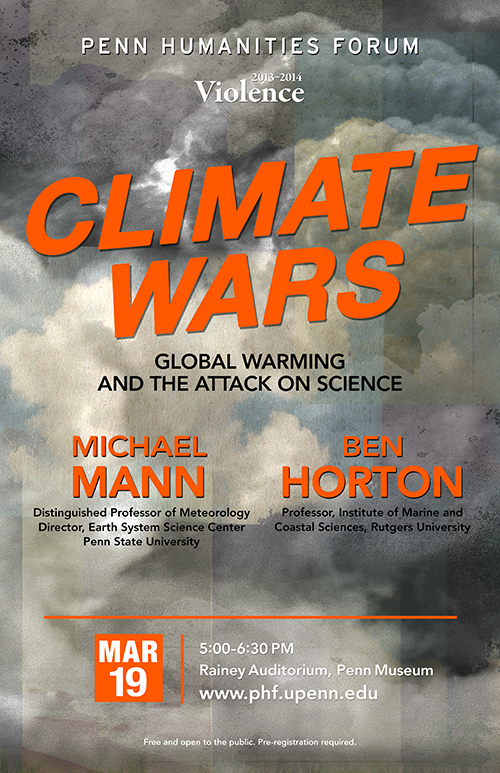Climate change research has been caught in a political storm that threatens to undermine legitimate scientific work. Michael Mann and Ben Horton, two leading climate change scientists, describe the fight against misinformation from the inside, balancing statistical analysis with personal anecdotes from their life and work. They show how little doubt there really is that human activities are causing rapid changes in the earth's climate.
Michael Mann was appointed Distinguished Professor of Meterology at Penn State in 2013, where he holds joint appointments in the departments of Meteorology and Geosciences as well as the Earth and Environmental Systems Institute. He also directs the university's Earth System Science Center. He took his B.A. in physics and applied math from Berkeley, his M.S. in physics from Yale, and his Ph.D. in geology and geophysics, also from Yale. He is a Fellow of the American Geophysical Union and the American Meteorological Society.
Mann's research involves the use of theoretical models and observational data to better understand Earth's climate system. Author of well over 150 refereed journal articles, and a cofounder of and contributor to the award-winning science website RealClimate.org, Mann has also written two books, Dire Predictions: Understanding Global Warming and The Hockey Stick and the Climate Wars: Dispatches from the Front Lines.
He was a lead author on "Observed Climate Variability and Change" (Chapter 2 in The Scientific Basis), which formed part of the Intergovernmental Panel on Climate Change (IPCC) Third Scientific Assessment Report in 2001. In 2002 he received NOAA's outstanding publication award and was named one of 50 leading visionaries in science and technology by Scientific American. His work with other authors of the IPCC Panel Report contributed to the award of the 2007 Nobel Peace Prize. In 2012 he was awarded the Hans Oeschger Medal of the European Geosciences Union, and in 2013 the National Conservation Achievement Award for Science by the National Wildlife Federation. In 2013, Bloomberg Markets magazine named Mann one of its 50 most influential people.
Ben Horton is Professor of Marine Sciences at the Institute of Marine and Coastal Science of Rutgers University, where he studies global sea-level change as well as earthquake and tsunami hazards. Before joining Rutgers in 2013, Horton was on the Earth and Environmental Science faculty of the University of Pennsylvania. He was appointed a Fellow of the Geological Society of America in 2013. Other honors include the Linnean Society Award for contributions to biological diversity and evolution in 2004, the W. Storrs Cole Memorial Research Award for contributions to micropaleontology from the Geological Society of America in 2007, and a Medal for Research Excellence by the Commanding General of the North Atlantic Division of the U.S. Army Corps of Engineers in 2010. He holds a Ph.D. in geography from the University of Durham, UK.
Horton has published extensively in leading journals, among them Science, Proceedings of the National Academy of Sciences, Nature Geoscience, and Geology. He is a contributing author to Climate Change 2013, the Fifth Assessment Report of the Intergovernmental Panel on Climate Change. He is project leader of the International Geoscience Programme 588, "Preparing for Coastal Change," and scientific advisor to The Future Ocean research of the German Research Foundation. In recent work, he helped develop predictive models of relative sea-level change along the Mid-Atlantic coastline, one of the most in-depth examinations of past, present, and future sea level rise of any region in the United States.
Distinguished Professor of Meteorology
Director, Earth System Science Center, Penn State University



